Cloud ERP Systems: Benefits, Challenges, and Implementation Strategies
VerifiedAdded on 2021/05/31
|14
|4138
|110
Report
AI Summary
This report presents a systematic literature review (SLR) on cloud-based Enterprise Resource Planning (ERP) systems. It begins by outlining the benefits of traditional ERP systems, such as improved data management and decision-making, and then transitions to the advantages of cloud computing, including scalability and cost-effectiveness. The core of the report examines the integration of cloud computing with ERP systems, exploring benefits like reduced upfront costs, rapid implementation, scalability, and improved accessibility, and the challenges, including subscription expenses, security concerns, performance risks, and customization limitations. The report delves into cloud ERP service models (SaaS, PaaS, IaaS), and concludes with a discussion on the evolving landscape of cloud ERP and its implications for businesses. The report is based on a systematic literature review, which involves the collection, evaluation, and synthesis of research evidence to answer a specific research question. The report is made available on Desklib, a platform that provides AI-based study tools for students.
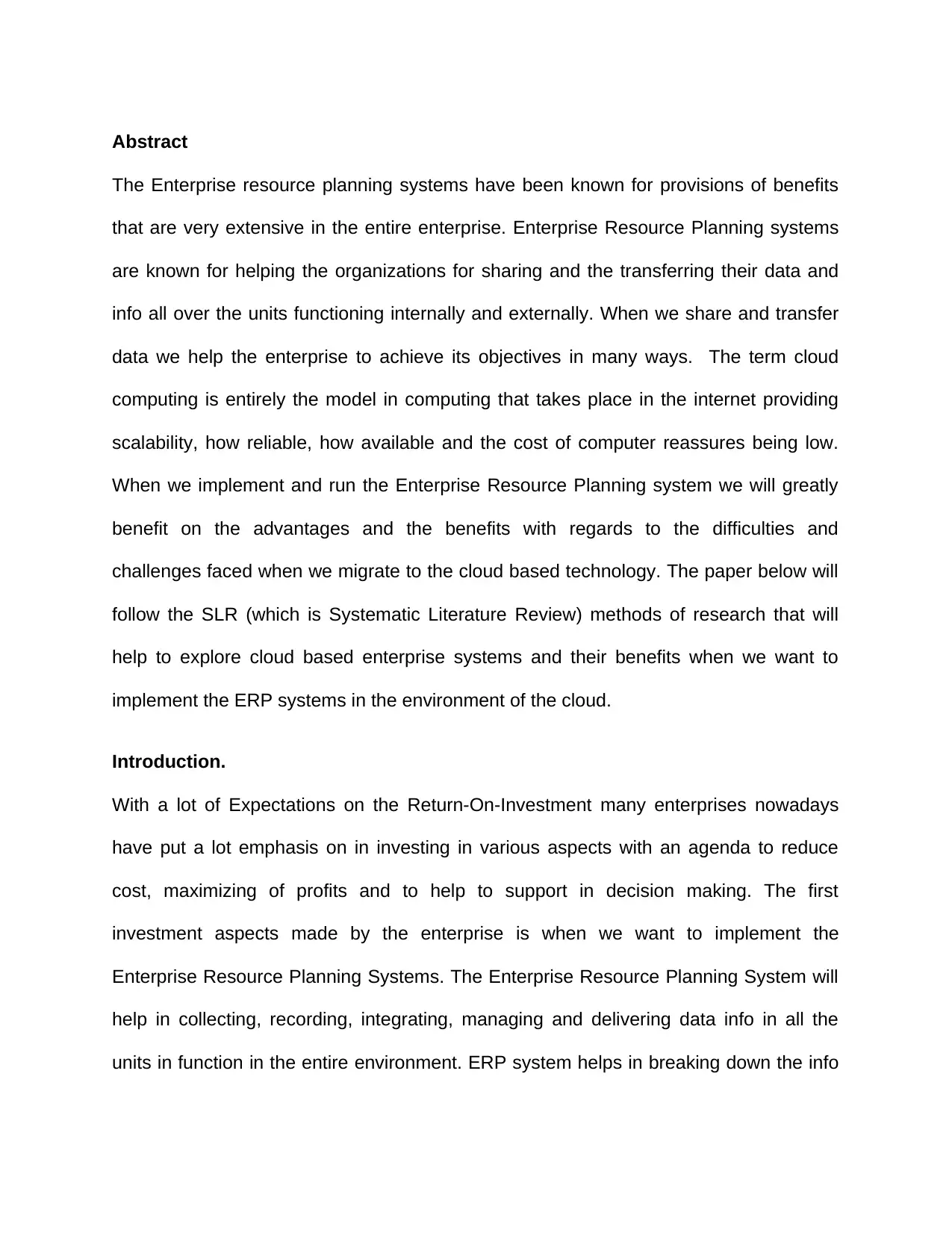
Abstract
The Enterprise resource planning systems have been known for provisions of benefits
that are very extensive in the entire enterprise. Enterprise Resource Planning systems
are known for helping the organizations for sharing and the transferring their data and
info all over the units functioning internally and externally. When we share and transfer
data we help the enterprise to achieve its objectives in many ways. The term cloud
computing is entirely the model in computing that takes place in the internet providing
scalability, how reliable, how available and the cost of computer reassures being low.
When we implement and run the Enterprise Resource Planning system we will greatly
benefit on the advantages and the benefits with regards to the difficulties and
challenges faced when we migrate to the cloud based technology. The paper below will
follow the SLR (which is Systematic Literature Review) methods of research that will
help to explore cloud based enterprise systems and their benefits when we want to
implement the ERP systems in the environment of the cloud.
Introduction.
With a lot of Expectations on the Return-On-Investment many enterprises nowadays
have put a lot emphasis on in investing in various aspects with an agenda to reduce
cost, maximizing of profits and to help to support in decision making. The first
investment aspects made by the enterprise is when we want to implement the
Enterprise Resource Planning Systems. The Enterprise Resource Planning System will
help in collecting, recording, integrating, managing and delivering data info in all the
units in function in the entire environment. ERP system helps in breaking down the info
The Enterprise resource planning systems have been known for provisions of benefits
that are very extensive in the entire enterprise. Enterprise Resource Planning systems
are known for helping the organizations for sharing and the transferring their data and
info all over the units functioning internally and externally. When we share and transfer
data we help the enterprise to achieve its objectives in many ways. The term cloud
computing is entirely the model in computing that takes place in the internet providing
scalability, how reliable, how available and the cost of computer reassures being low.
When we implement and run the Enterprise Resource Planning system we will greatly
benefit on the advantages and the benefits with regards to the difficulties and
challenges faced when we migrate to the cloud based technology. The paper below will
follow the SLR (which is Systematic Literature Review) methods of research that will
help to explore cloud based enterprise systems and their benefits when we want to
implement the ERP systems in the environment of the cloud.
Introduction.
With a lot of Expectations on the Return-On-Investment many enterprises nowadays
have put a lot emphasis on in investing in various aspects with an agenda to reduce
cost, maximizing of profits and to help to support in decision making. The first
investment aspects made by the enterprise is when we want to implement the
Enterprise Resource Planning Systems. The Enterprise Resource Planning System will
help in collecting, recording, integrating, managing and delivering data info in all the
units in function in the entire environment. ERP system helps in breaking down the info
Paraphrase This Document
Need a fresh take? Get an instant paraphrase of this document with our AI Paraphraser
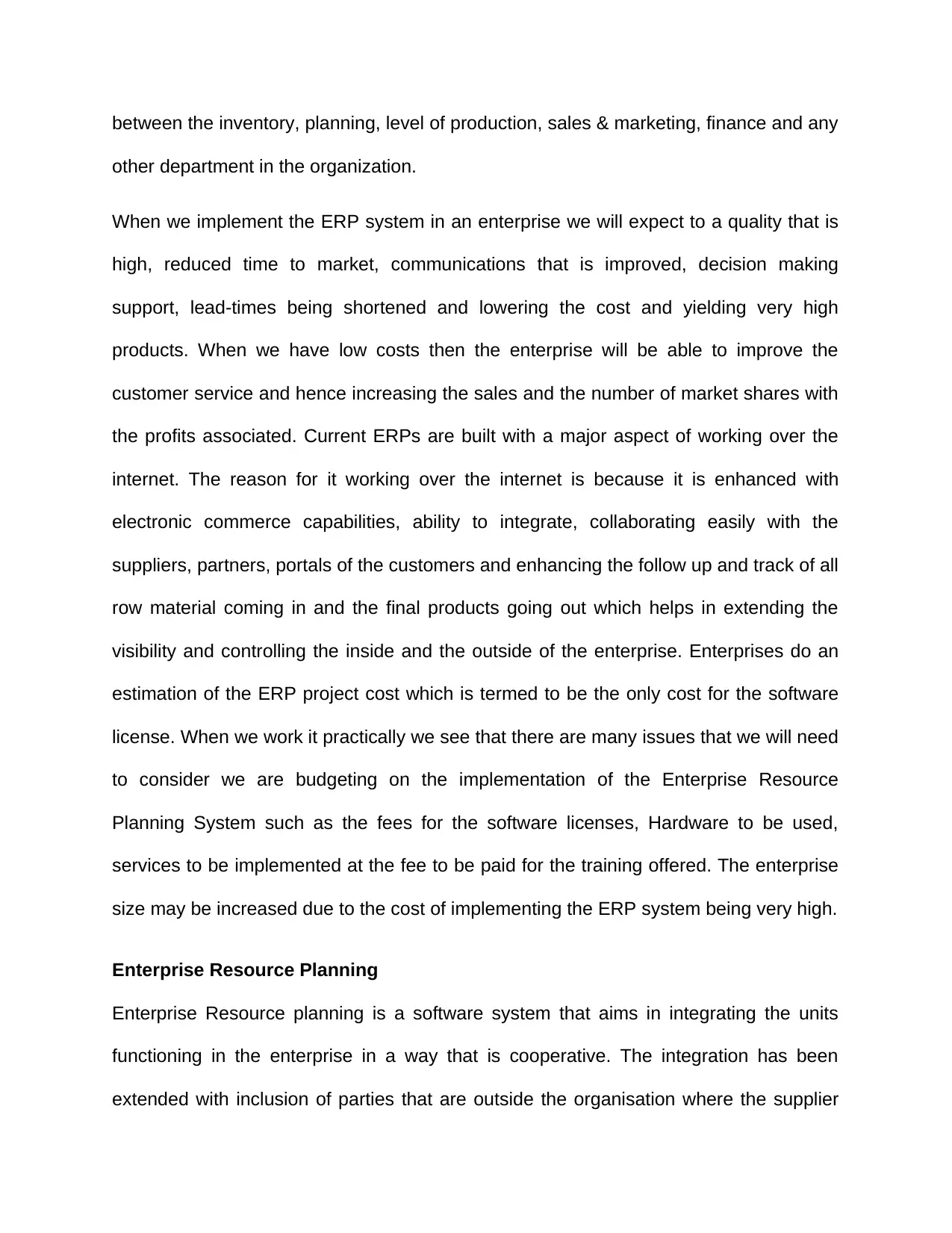
between the inventory, planning, level of production, sales & marketing, finance and any
other department in the organization.
When we implement the ERP system in an enterprise we will expect to a quality that is
high, reduced time to market, communications that is improved, decision making
support, lead-times being shortened and lowering the cost and yielding very high
products. When we have low costs then the enterprise will be able to improve the
customer service and hence increasing the sales and the number of market shares with
the profits associated. Current ERPs are built with a major aspect of working over the
internet. The reason for it working over the internet is because it is enhanced with
electronic commerce capabilities, ability to integrate, collaborating easily with the
suppliers, partners, portals of the customers and enhancing the follow up and track of all
row material coming in and the final products going out which helps in extending the
visibility and controlling the inside and the outside of the enterprise. Enterprises do an
estimation of the ERP project cost which is termed to be the only cost for the software
license. When we work it practically we see that there are many issues that we will need
to consider we are budgeting on the implementation of the Enterprise Resource
Planning System such as the fees for the software licenses, Hardware to be used,
services to be implemented at the fee to be paid for the training offered. The enterprise
size may be increased due to the cost of implementing the ERP system being very high.
Enterprise Resource Planning
Enterprise Resource planning is a software system that aims in integrating the units
functioning in the enterprise in a way that is cooperative. The integration has been
extended with inclusion of parties that are outside the organisation where the supplier
other department in the organization.
When we implement the ERP system in an enterprise we will expect to a quality that is
high, reduced time to market, communications that is improved, decision making
support, lead-times being shortened and lowering the cost and yielding very high
products. When we have low costs then the enterprise will be able to improve the
customer service and hence increasing the sales and the number of market shares with
the profits associated. Current ERPs are built with a major aspect of working over the
internet. The reason for it working over the internet is because it is enhanced with
electronic commerce capabilities, ability to integrate, collaborating easily with the
suppliers, partners, portals of the customers and enhancing the follow up and track of all
row material coming in and the final products going out which helps in extending the
visibility and controlling the inside and the outside of the enterprise. Enterprises do an
estimation of the ERP project cost which is termed to be the only cost for the software
license. When we work it practically we see that there are many issues that we will need
to consider we are budgeting on the implementation of the Enterprise Resource
Planning System such as the fees for the software licenses, Hardware to be used,
services to be implemented at the fee to be paid for the training offered. The enterprise
size may be increased due to the cost of implementing the ERP system being very high.
Enterprise Resource Planning
Enterprise Resource planning is a software system that aims in integrating the units
functioning in the enterprise in a way that is cooperative. The integration has been
extended with inclusion of parties that are outside the organisation where the supplier
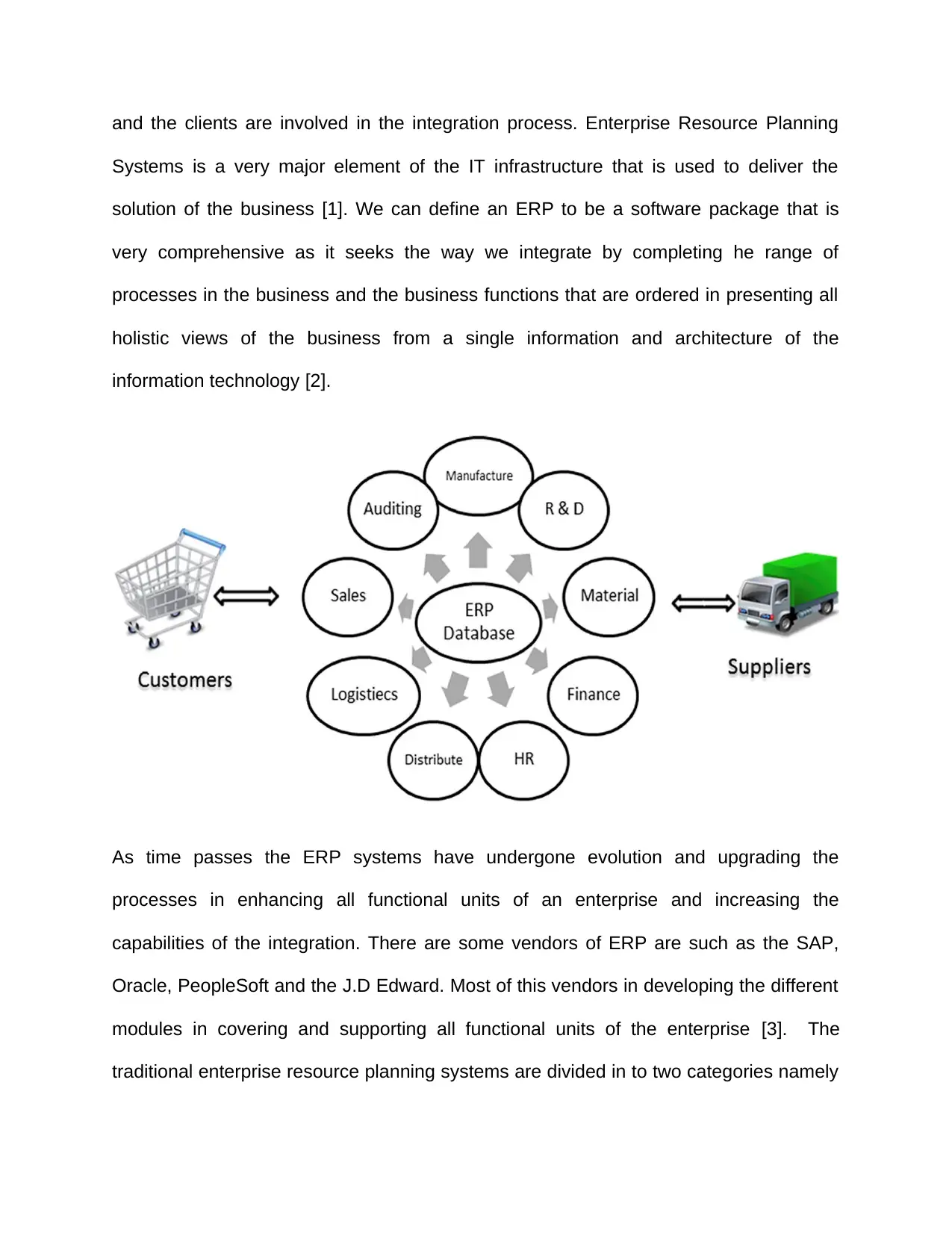
and the clients are involved in the integration process. Enterprise Resource Planning
Systems is a very major element of the IT infrastructure that is used to deliver the
solution of the business [1]. We can define an ERP to be a software package that is
very comprehensive as it seeks the way we integrate by completing he range of
processes in the business and the business functions that are ordered in presenting all
holistic views of the business from a single information and architecture of the
information technology [2].
As time passes the ERP systems have undergone evolution and upgrading the
processes in enhancing all functional units of an enterprise and increasing the
capabilities of the integration. There are some vendors of ERP are such as the SAP,
Oracle, PeopleSoft and the J.D Edward. Most of this vendors in developing the different
modules in covering and supporting all functional units of the enterprise [3]. The
traditional enterprise resource planning systems are divided in to two categories namely
Systems is a very major element of the IT infrastructure that is used to deliver the
solution of the business [1]. We can define an ERP to be a software package that is
very comprehensive as it seeks the way we integrate by completing he range of
processes in the business and the business functions that are ordered in presenting all
holistic views of the business from a single information and architecture of the
information technology [2].
As time passes the ERP systems have undergone evolution and upgrading the
processes in enhancing all functional units of an enterprise and increasing the
capabilities of the integration. There are some vendors of ERP are such as the SAP,
Oracle, PeopleSoft and the J.D Edward. Most of this vendors in developing the different
modules in covering and supporting all functional units of the enterprise [3]. The
traditional enterprise resource planning systems are divided in to two categories namely
⊘ This is a preview!⊘
Do you want full access?
Subscribe today to unlock all pages.

Trusted by 1+ million students worldwide
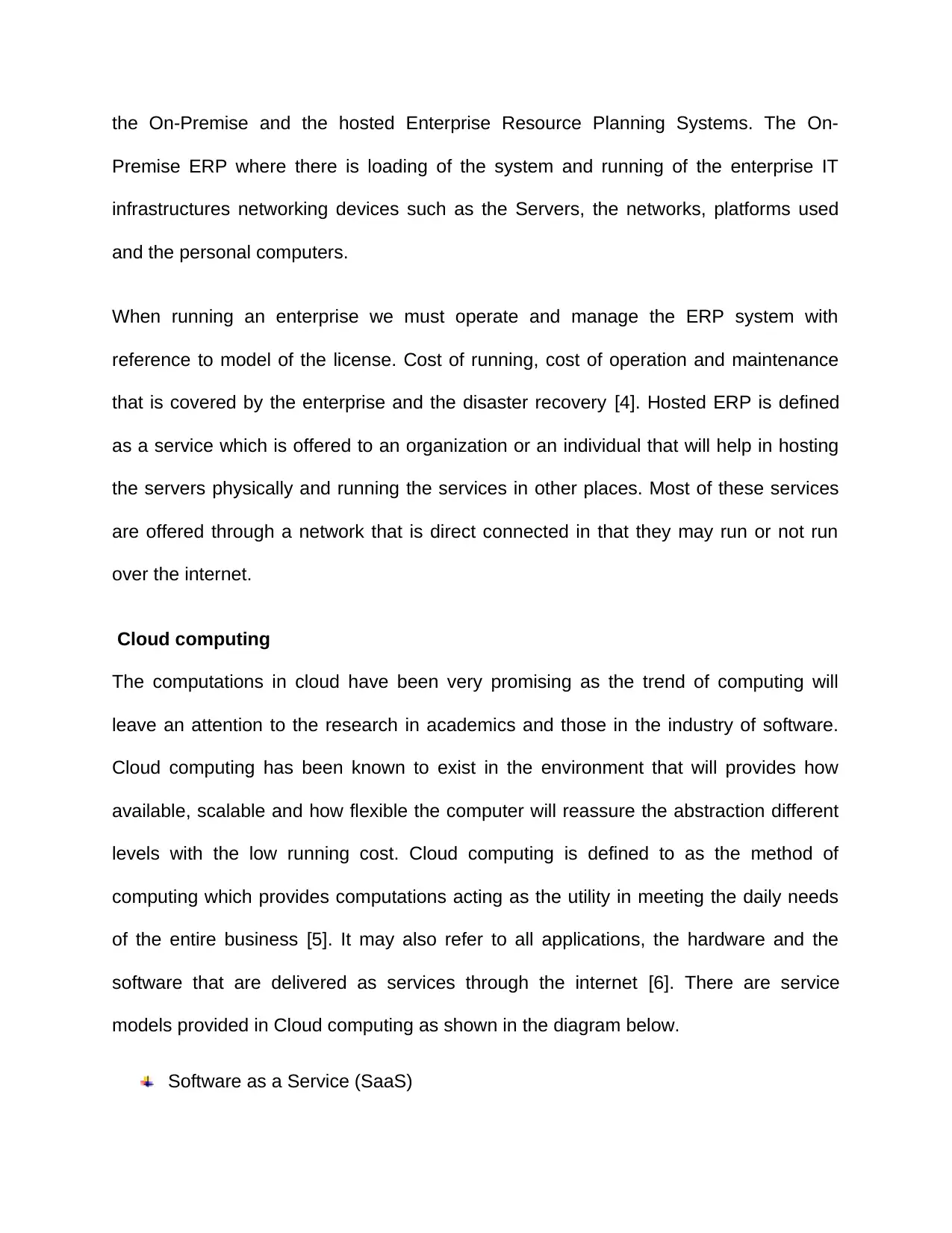
the On-Premise and the hosted Enterprise Resource Planning Systems. The On-
Premise ERP where there is loading of the system and running of the enterprise IT
infrastructures networking devices such as the Servers, the networks, platforms used
and the personal computers.
When running an enterprise we must operate and manage the ERP system with
reference to model of the license. Cost of running, cost of operation and maintenance
that is covered by the enterprise and the disaster recovery [4]. Hosted ERP is defined
as a service which is offered to an organization or an individual that will help in hosting
the servers physically and running the services in other places. Most of these services
are offered through a network that is direct connected in that they may run or not run
over the internet.
Cloud computing
The computations in cloud have been very promising as the trend of computing will
leave an attention to the research in academics and those in the industry of software.
Cloud computing has been known to exist in the environment that will provides how
available, scalable and how flexible the computer will reassure the abstraction different
levels with the low running cost. Cloud computing is defined to as the method of
computing which provides computations acting as the utility in meeting the daily needs
of the entire business [5]. It may also refer to all applications, the hardware and the
software that are delivered as services through the internet [6]. There are service
models provided in Cloud computing as shown in the diagram below.
Software as a Service (SaaS)
Premise ERP where there is loading of the system and running of the enterprise IT
infrastructures networking devices such as the Servers, the networks, platforms used
and the personal computers.
When running an enterprise we must operate and manage the ERP system with
reference to model of the license. Cost of running, cost of operation and maintenance
that is covered by the enterprise and the disaster recovery [4]. Hosted ERP is defined
as a service which is offered to an organization or an individual that will help in hosting
the servers physically and running the services in other places. Most of these services
are offered through a network that is direct connected in that they may run or not run
over the internet.
Cloud computing
The computations in cloud have been very promising as the trend of computing will
leave an attention to the research in academics and those in the industry of software.
Cloud computing has been known to exist in the environment that will provides how
available, scalable and how flexible the computer will reassure the abstraction different
levels with the low running cost. Cloud computing is defined to as the method of
computing which provides computations acting as the utility in meeting the daily needs
of the entire business [5]. It may also refer to all applications, the hardware and the
software that are delivered as services through the internet [6]. There are service
models provided in Cloud computing as shown in the diagram below.
Software as a Service (SaaS)
Paraphrase This Document
Need a fresh take? Get an instant paraphrase of this document with our AI Paraphraser
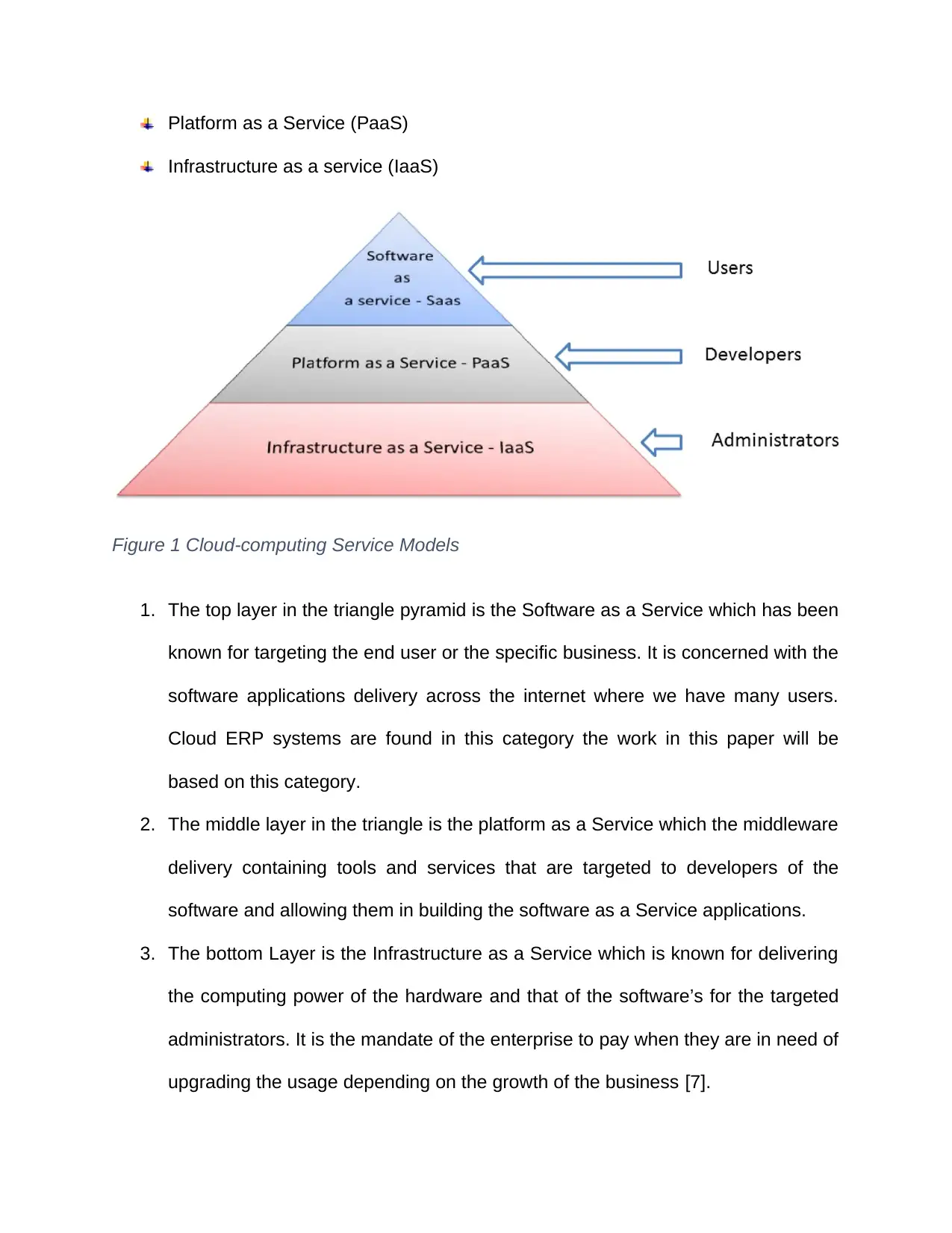
Platform as a Service (PaaS)
Infrastructure as a service (IaaS)
Figure 1 Cloud-computing Service Models
1. The top layer in the triangle pyramid is the Software as a Service which has been
known for targeting the end user or the specific business. It is concerned with the
software applications delivery across the internet where we have many users.
Cloud ERP systems are found in this category the work in this paper will be
based on this category.
2. The middle layer in the triangle is the platform as a Service which the middleware
delivery containing tools and services that are targeted to developers of the
software and allowing them in building the software as a Service applications.
3. The bottom Layer is the Infrastructure as a Service which is known for delivering
the computing power of the hardware and that of the software’s for the targeted
administrators. It is the mandate of the enterprise to pay when they are in need of
upgrading the usage depending on the growth of the business [7].
Infrastructure as a service (IaaS)
Figure 1 Cloud-computing Service Models
1. The top layer in the triangle pyramid is the Software as a Service which has been
known for targeting the end user or the specific business. It is concerned with the
software applications delivery across the internet where we have many users.
Cloud ERP systems are found in this category the work in this paper will be
based on this category.
2. The middle layer in the triangle is the platform as a Service which the middleware
delivery containing tools and services that are targeted to developers of the
software and allowing them in building the software as a Service applications.
3. The bottom Layer is the Infrastructure as a Service which is known for delivering
the computing power of the hardware and that of the software’s for the targeted
administrators. It is the mandate of the enterprise to pay when they are in need of
upgrading the usage depending on the growth of the business [7].
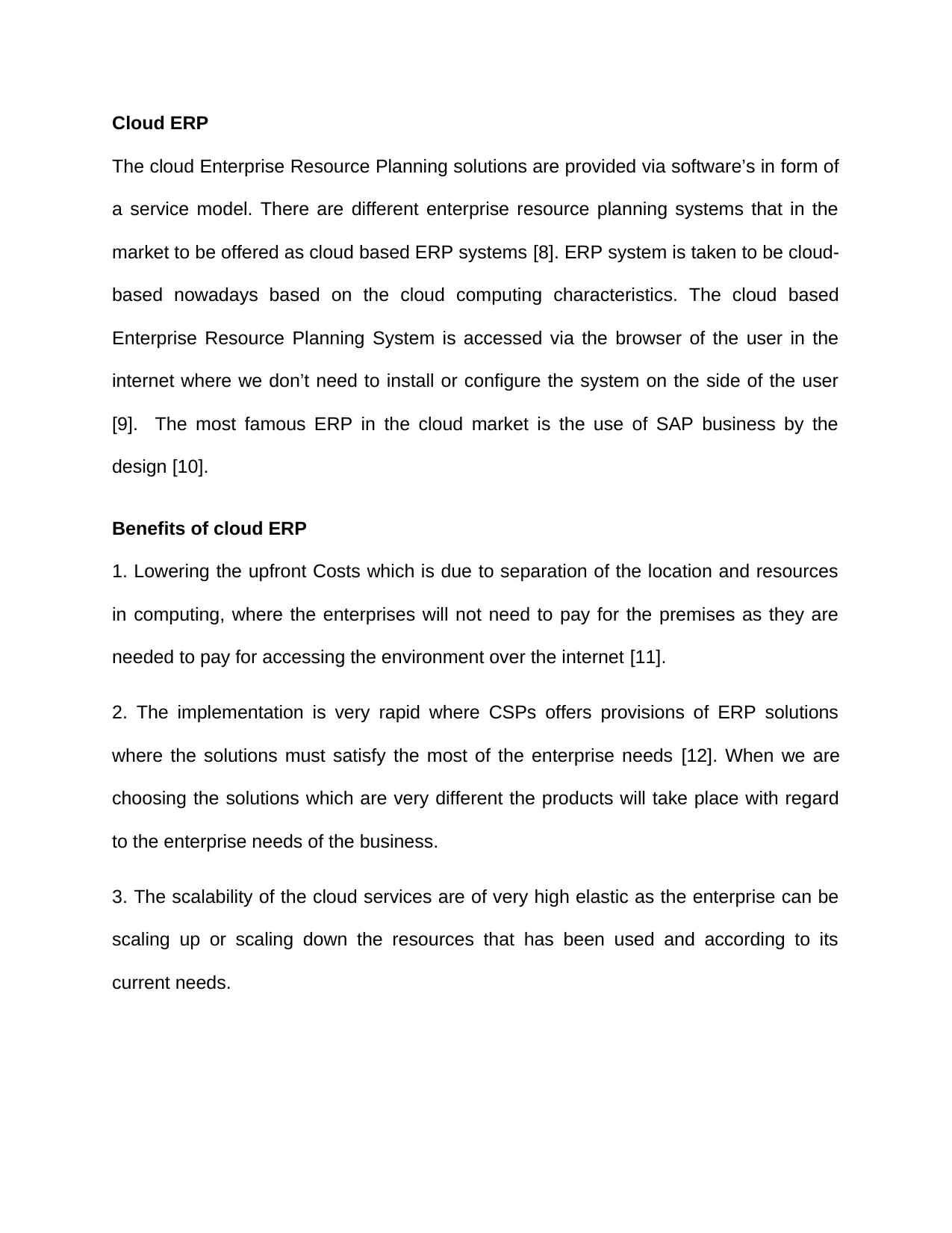
Cloud ERP
The cloud Enterprise Resource Planning solutions are provided via software’s in form of
a service model. There are different enterprise resource planning systems that in the
market to be offered as cloud based ERP systems [8]. ERP system is taken to be cloud-
based nowadays based on the cloud computing characteristics. The cloud based
Enterprise Resource Planning System is accessed via the browser of the user in the
internet where we don’t need to install or configure the system on the side of the user
[9]. The most famous ERP in the cloud market is the use of SAP business by the
design [10].
Benefits of cloud ERP
1. Lowering the upfront Costs which is due to separation of the location and resources
in computing, where the enterprises will not need to pay for the premises as they are
needed to pay for accessing the environment over the internet [11].
2. The implementation is very rapid where CSPs offers provisions of ERP solutions
where the solutions must satisfy the most of the enterprise needs [12]. When we are
choosing the solutions which are very different the products will take place with regard
to the enterprise needs of the business.
3. The scalability of the cloud services are of very high elastic as the enterprise can be
scaling up or scaling down the resources that has been used and according to its
current needs.
The cloud Enterprise Resource Planning solutions are provided via software’s in form of
a service model. There are different enterprise resource planning systems that in the
market to be offered as cloud based ERP systems [8]. ERP system is taken to be cloud-
based nowadays based on the cloud computing characteristics. The cloud based
Enterprise Resource Planning System is accessed via the browser of the user in the
internet where we don’t need to install or configure the system on the side of the user
[9]. The most famous ERP in the cloud market is the use of SAP business by the
design [10].
Benefits of cloud ERP
1. Lowering the upfront Costs which is due to separation of the location and resources
in computing, where the enterprises will not need to pay for the premises as they are
needed to pay for accessing the environment over the internet [11].
2. The implementation is very rapid where CSPs offers provisions of ERP solutions
where the solutions must satisfy the most of the enterprise needs [12]. When we are
choosing the solutions which are very different the products will take place with regard
to the enterprise needs of the business.
3. The scalability of the cloud services are of very high elastic as the enterprise can be
scaling up or scaling down the resources that has been used and according to its
current needs.
⊘ This is a preview!⊘
Do you want full access?
Subscribe today to unlock all pages.

Trusted by 1+ million students worldwide
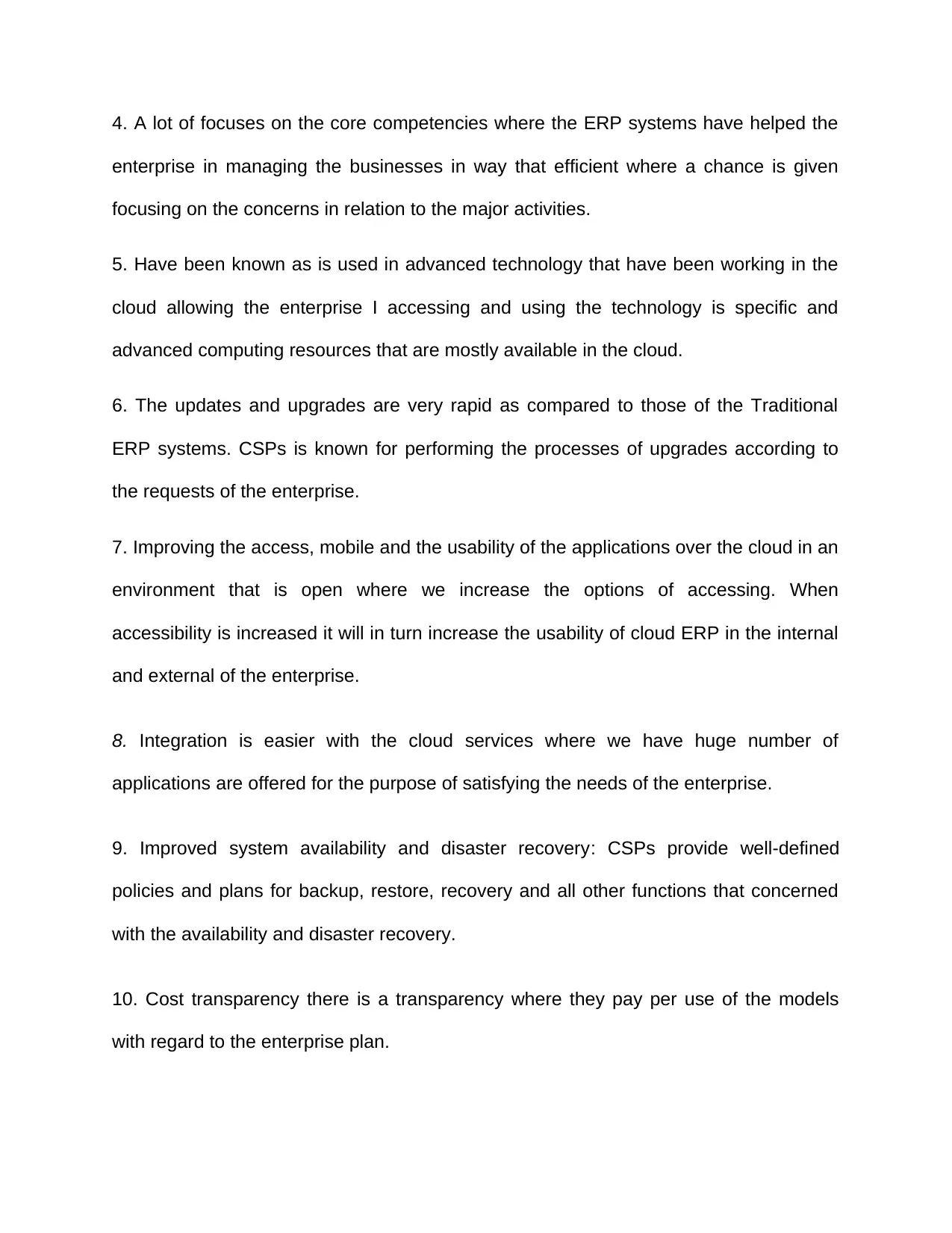
4. A lot of focuses on the core competencies where the ERP systems have helped the
enterprise in managing the businesses in way that efficient where a chance is given
focusing on the concerns in relation to the major activities.
5. Have been known as is used in advanced technology that have been working in the
cloud allowing the enterprise I accessing and using the technology is specific and
advanced computing resources that are mostly available in the cloud.
6. The updates and upgrades are very rapid as compared to those of the Traditional
ERP systems. CSPs is known for performing the processes of upgrades according to
the requests of the enterprise.
7. Improving the access, mobile and the usability of the applications over the cloud in an
environment that is open where we increase the options of accessing. When
accessibility is increased it will in turn increase the usability of cloud ERP in the internal
and external of the enterprise.
8. Integration is easier with the cloud services where we have huge number of
applications are offered for the purpose of satisfying the needs of the enterprise.
9. Improved system availability and disaster recovery: CSPs provide well-defined
policies and plans for backup, restore, recovery and all other functions that concerned
with the availability and disaster recovery.
10. Cost transparency there is a transparency where they pay per use of the models
with regard to the enterprise plan.
enterprise in managing the businesses in way that efficient where a chance is given
focusing on the concerns in relation to the major activities.
5. Have been known as is used in advanced technology that have been working in the
cloud allowing the enterprise I accessing and using the technology is specific and
advanced computing resources that are mostly available in the cloud.
6. The updates and upgrades are very rapid as compared to those of the Traditional
ERP systems. CSPs is known for performing the processes of upgrades according to
the requests of the enterprise.
7. Improving the access, mobile and the usability of the applications over the cloud in an
environment that is open where we increase the options of accessing. When
accessibility is increased it will in turn increase the usability of cloud ERP in the internal
and external of the enterprise.
8. Integration is easier with the cloud services where we have huge number of
applications are offered for the purpose of satisfying the needs of the enterprise.
9. Improved system availability and disaster recovery: CSPs provide well-defined
policies and plans for backup, restore, recovery and all other functions that concerned
with the availability and disaster recovery.
10. Cost transparency there is a transparency where they pay per use of the models
with regard to the enterprise plan.
Paraphrase This Document
Need a fresh take? Get an instant paraphrase of this document with our AI Paraphraser
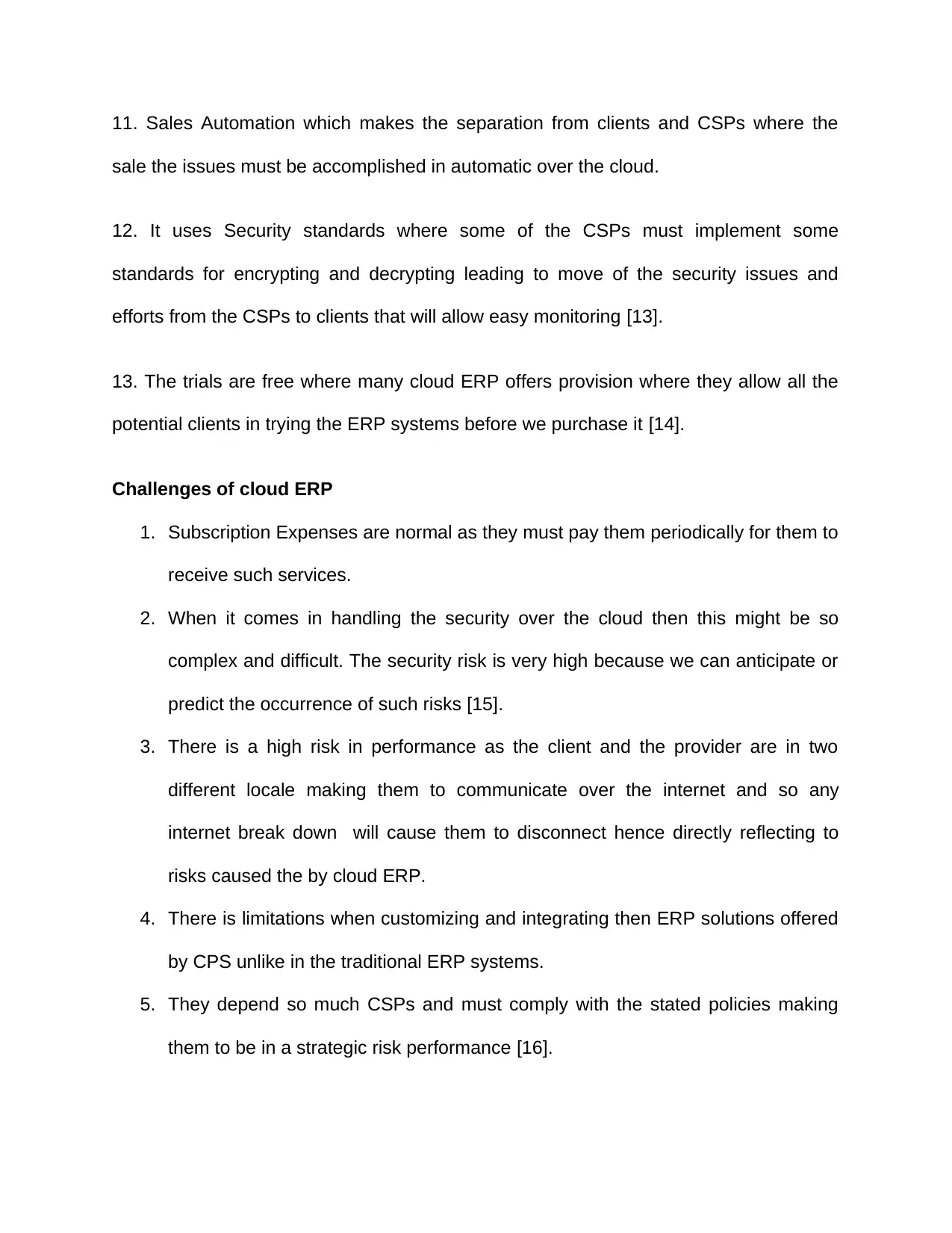
11. Sales Automation which makes the separation from clients and CSPs where the
sale the issues must be accomplished in automatic over the cloud.
12. It uses Security standards where some of the CSPs must implement some
standards for encrypting and decrypting leading to move of the security issues and
efforts from the CSPs to clients that will allow easy monitoring [13].
13. The trials are free where many cloud ERP offers provision where they allow all the
potential clients in trying the ERP systems before we purchase it [14].
Challenges of cloud ERP
1. Subscription Expenses are normal as they must pay them periodically for them to
receive such services.
2. When it comes in handling the security over the cloud then this might be so
complex and difficult. The security risk is very high because we can anticipate or
predict the occurrence of such risks [15].
3. There is a high risk in performance as the client and the provider are in two
different locale making them to communicate over the internet and so any
internet break down will cause them to disconnect hence directly reflecting to
risks caused the by cloud ERP.
4. There is limitations when customizing and integrating then ERP solutions offered
by CPS unlike in the traditional ERP systems.
5. They depend so much CSPs and must comply with the stated policies making
them to be in a strategic risk performance [16].
sale the issues must be accomplished in automatic over the cloud.
12. It uses Security standards where some of the CSPs must implement some
standards for encrypting and decrypting leading to move of the security issues and
efforts from the CSPs to clients that will allow easy monitoring [13].
13. The trials are free where many cloud ERP offers provision where they allow all the
potential clients in trying the ERP systems before we purchase it [14].
Challenges of cloud ERP
1. Subscription Expenses are normal as they must pay them periodically for them to
receive such services.
2. When it comes in handling the security over the cloud then this might be so
complex and difficult. The security risk is very high because we can anticipate or
predict the occurrence of such risks [15].
3. There is a high risk in performance as the client and the provider are in two
different locale making them to communicate over the internet and so any
internet break down will cause them to disconnect hence directly reflecting to
risks caused the by cloud ERP.
4. There is limitations when customizing and integrating then ERP solutions offered
by CPS unlike in the traditional ERP systems.
5. They depend so much CSPs and must comply with the stated policies making
them to be in a strategic risk performance [16].
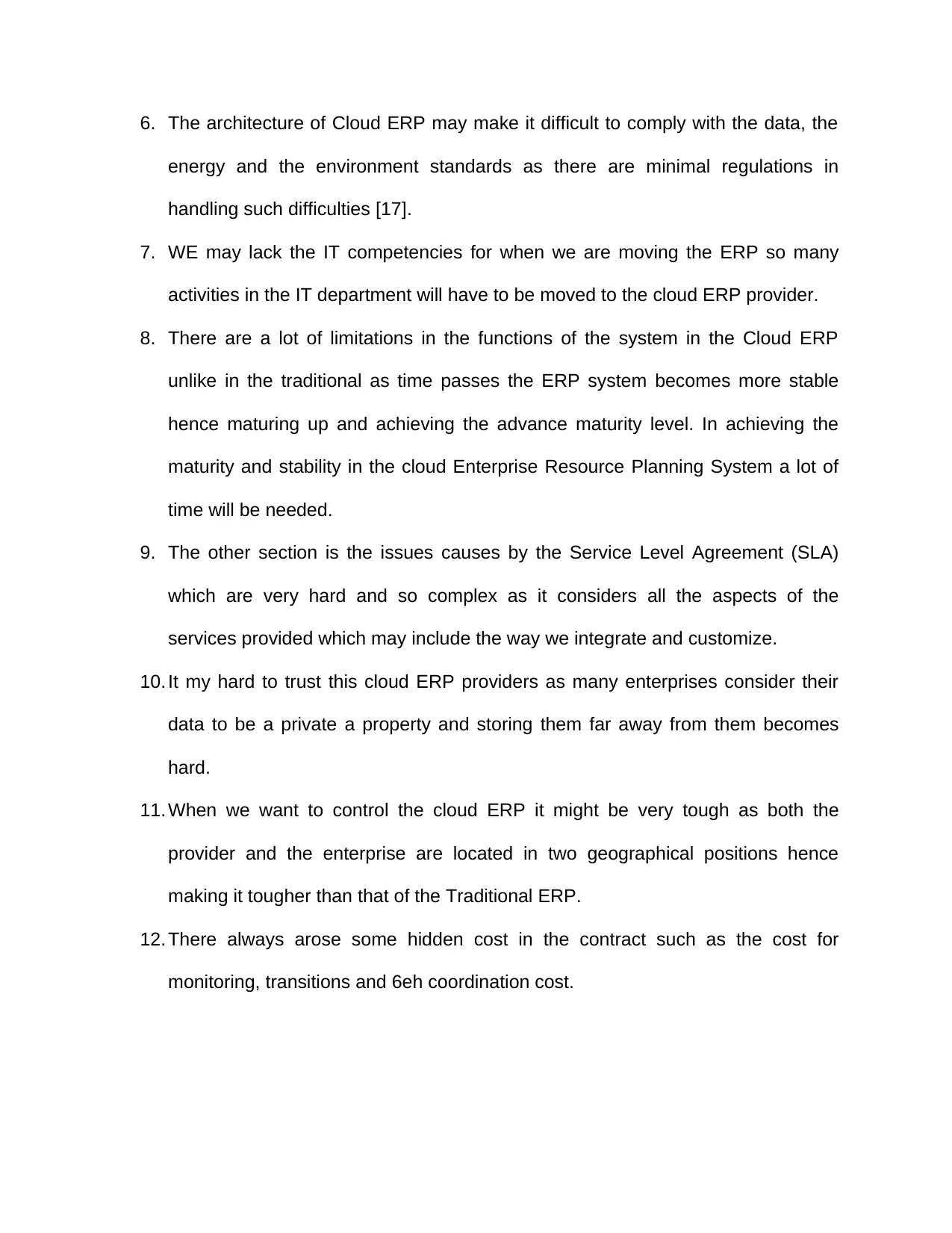
6. The architecture of Cloud ERP may make it difficult to comply with the data, the
energy and the environment standards as there are minimal regulations in
handling such difficulties [17].
7. WE may lack the IT competencies for when we are moving the ERP so many
activities in the IT department will have to be moved to the cloud ERP provider.
8. There are a lot of limitations in the functions of the system in the Cloud ERP
unlike in the traditional as time passes the ERP system becomes more stable
hence maturing up and achieving the advance maturity level. In achieving the
maturity and stability in the cloud Enterprise Resource Planning System a lot of
time will be needed.
9. The other section is the issues causes by the Service Level Agreement (SLA)
which are very hard and so complex as it considers all the aspects of the
services provided which may include the way we integrate and customize.
10. It my hard to trust this cloud ERP providers as many enterprises consider their
data to be a private a property and storing them far away from them becomes
hard.
11. When we want to control the cloud ERP it might be very tough as both the
provider and the enterprise are located in two geographical positions hence
making it tougher than that of the Traditional ERP.
12. There always arose some hidden cost in the contract such as the cost for
monitoring, transitions and 6eh coordination cost.
energy and the environment standards as there are minimal regulations in
handling such difficulties [17].
7. WE may lack the IT competencies for when we are moving the ERP so many
activities in the IT department will have to be moved to the cloud ERP provider.
8. There are a lot of limitations in the functions of the system in the Cloud ERP
unlike in the traditional as time passes the ERP system becomes more stable
hence maturing up and achieving the advance maturity level. In achieving the
maturity and stability in the cloud Enterprise Resource Planning System a lot of
time will be needed.
9. The other section is the issues causes by the Service Level Agreement (SLA)
which are very hard and so complex as it considers all the aspects of the
services provided which may include the way we integrate and customize.
10. It my hard to trust this cloud ERP providers as many enterprises consider their
data to be a private a property and storing them far away from them becomes
hard.
11. When we want to control the cloud ERP it might be very tough as both the
provider and the enterprise are located in two geographical positions hence
making it tougher than that of the Traditional ERP.
12. There always arose some hidden cost in the contract such as the cost for
monitoring, transitions and 6eh coordination cost.
⊘ This is a preview!⊘
Do you want full access?
Subscribe today to unlock all pages.

Trusted by 1+ million students worldwide
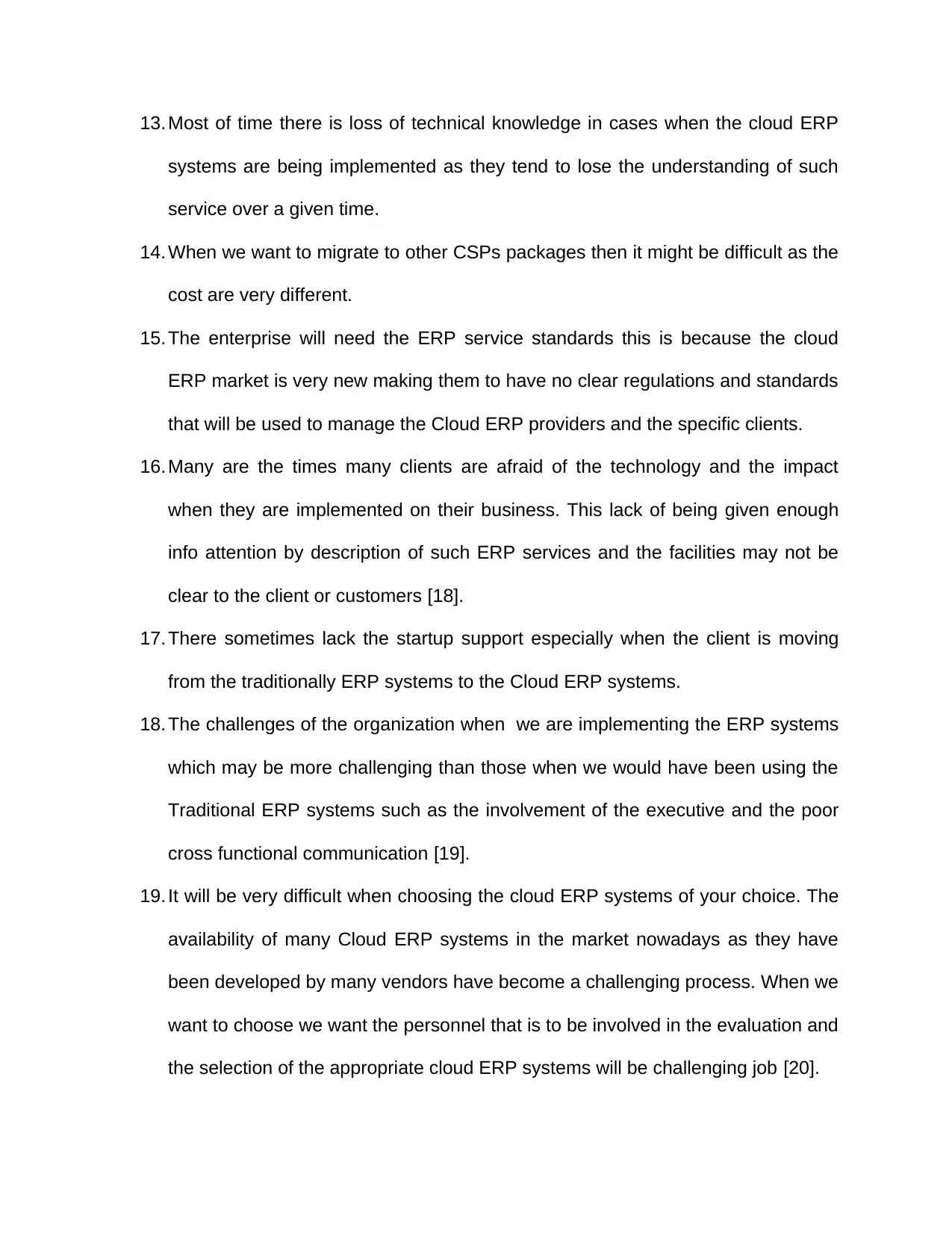
13. Most of time there is loss of technical knowledge in cases when the cloud ERP
systems are being implemented as they tend to lose the understanding of such
service over a given time.
14. When we want to migrate to other CSPs packages then it might be difficult as the
cost are very different.
15. The enterprise will need the ERP service standards this is because the cloud
ERP market is very new making them to have no clear regulations and standards
that will be used to manage the Cloud ERP providers and the specific clients.
16. Many are the times many clients are afraid of the technology and the impact
when they are implemented on their business. This lack of being given enough
info attention by description of such ERP services and the facilities may not be
clear to the client or customers [18].
17. There sometimes lack the startup support especially when the client is moving
from the traditionally ERP systems to the Cloud ERP systems.
18. The challenges of the organization when we are implementing the ERP systems
which may be more challenging than those when we would have been using the
Traditional ERP systems such as the involvement of the executive and the poor
cross functional communication [19].
19. It will be very difficult when choosing the cloud ERP systems of your choice. The
availability of many Cloud ERP systems in the market nowadays as they have
been developed by many vendors have become a challenging process. When we
want to choose we want the personnel that is to be involved in the evaluation and
the selection of the appropriate cloud ERP systems will be challenging job [20].
systems are being implemented as they tend to lose the understanding of such
service over a given time.
14. When we want to migrate to other CSPs packages then it might be difficult as the
cost are very different.
15. The enterprise will need the ERP service standards this is because the cloud
ERP market is very new making them to have no clear regulations and standards
that will be used to manage the Cloud ERP providers and the specific clients.
16. Many are the times many clients are afraid of the technology and the impact
when they are implemented on their business. This lack of being given enough
info attention by description of such ERP services and the facilities may not be
clear to the client or customers [18].
17. There sometimes lack the startup support especially when the client is moving
from the traditionally ERP systems to the Cloud ERP systems.
18. The challenges of the organization when we are implementing the ERP systems
which may be more challenging than those when we would have been using the
Traditional ERP systems such as the involvement of the executive and the poor
cross functional communication [19].
19. It will be very difficult when choosing the cloud ERP systems of your choice. The
availability of many Cloud ERP systems in the market nowadays as they have
been developed by many vendors have become a challenging process. When we
want to choose we want the personnel that is to be involved in the evaluation and
the selection of the appropriate cloud ERP systems will be challenging job [20].
Paraphrase This Document
Need a fresh take? Get an instant paraphrase of this document with our AI Paraphraser
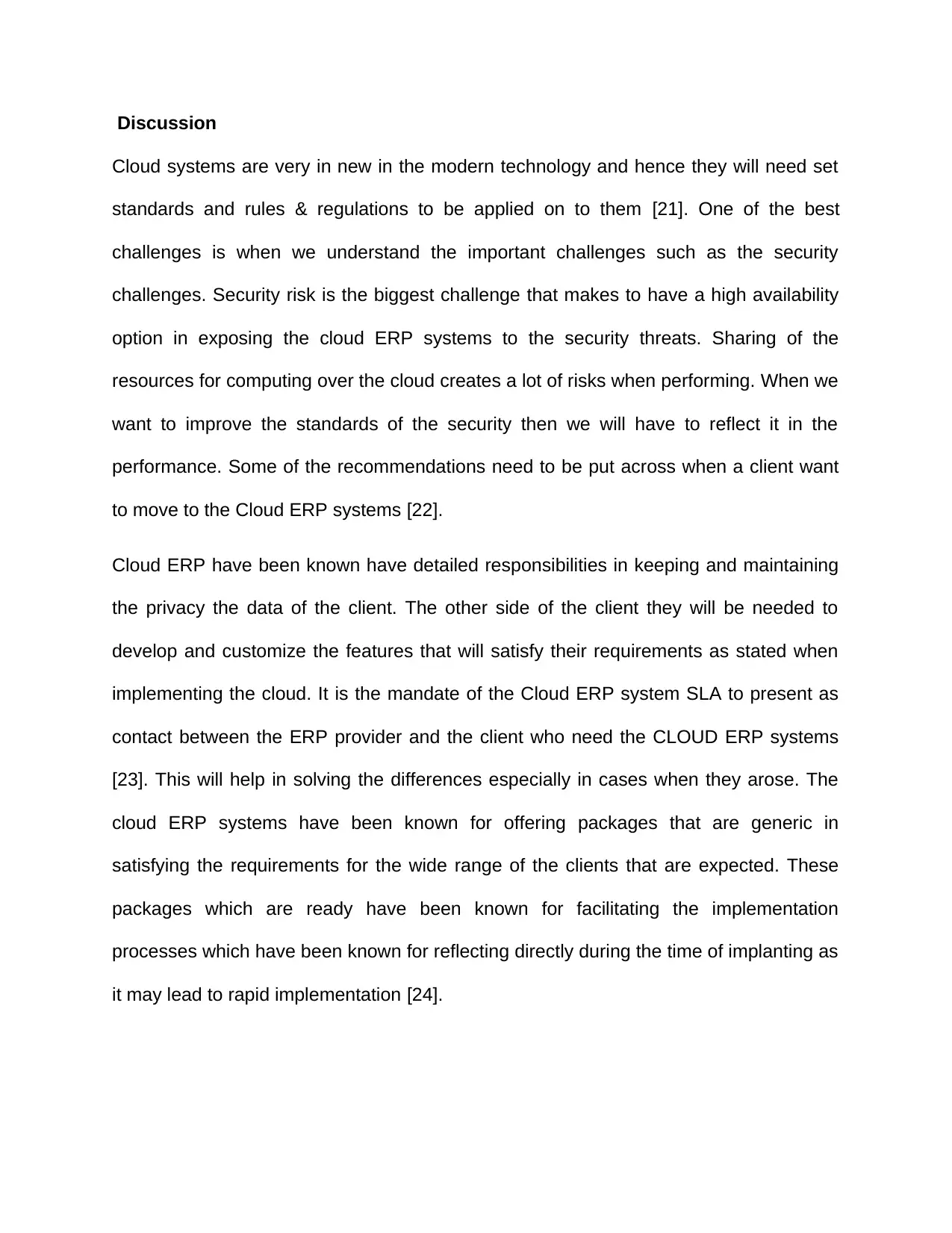
Discussion
Cloud systems are very in new in the modern technology and hence they will need set
standards and rules & regulations to be applied on to them [21]. One of the best
challenges is when we understand the important challenges such as the security
challenges. Security risk is the biggest challenge that makes to have a high availability
option in exposing the cloud ERP systems to the security threats. Sharing of the
resources for computing over the cloud creates a lot of risks when performing. When we
want to improve the standards of the security then we will have to reflect it in the
performance. Some of the recommendations need to be put across when a client want
to move to the Cloud ERP systems [22].
Cloud ERP have been known have detailed responsibilities in keeping and maintaining
the privacy the data of the client. The other side of the client they will be needed to
develop and customize the features that will satisfy their requirements as stated when
implementing the cloud. It is the mandate of the Cloud ERP system SLA to present as
contact between the ERP provider and the client who need the CLOUD ERP systems
[23]. This will help in solving the differences especially in cases when they arose. The
cloud ERP systems have been known for offering packages that are generic in
satisfying the requirements for the wide range of the clients that are expected. These
packages which are ready have been known for facilitating the implementation
processes which have been known for reflecting directly during the time of implanting as
it may lead to rapid implementation [24].
Cloud systems are very in new in the modern technology and hence they will need set
standards and rules & regulations to be applied on to them [21]. One of the best
challenges is when we understand the important challenges such as the security
challenges. Security risk is the biggest challenge that makes to have a high availability
option in exposing the cloud ERP systems to the security threats. Sharing of the
resources for computing over the cloud creates a lot of risks when performing. When we
want to improve the standards of the security then we will have to reflect it in the
performance. Some of the recommendations need to be put across when a client want
to move to the Cloud ERP systems [22].
Cloud ERP have been known have detailed responsibilities in keeping and maintaining
the privacy the data of the client. The other side of the client they will be needed to
develop and customize the features that will satisfy their requirements as stated when
implementing the cloud. It is the mandate of the Cloud ERP system SLA to present as
contact between the ERP provider and the client who need the CLOUD ERP systems
[23]. This will help in solving the differences especially in cases when they arose. The
cloud ERP systems have been known for offering packages that are generic in
satisfying the requirements for the wide range of the clients that are expected. These
packages which are ready have been known for facilitating the implementation
processes which have been known for reflecting directly during the time of implanting as
it may lead to rapid implementation [24].
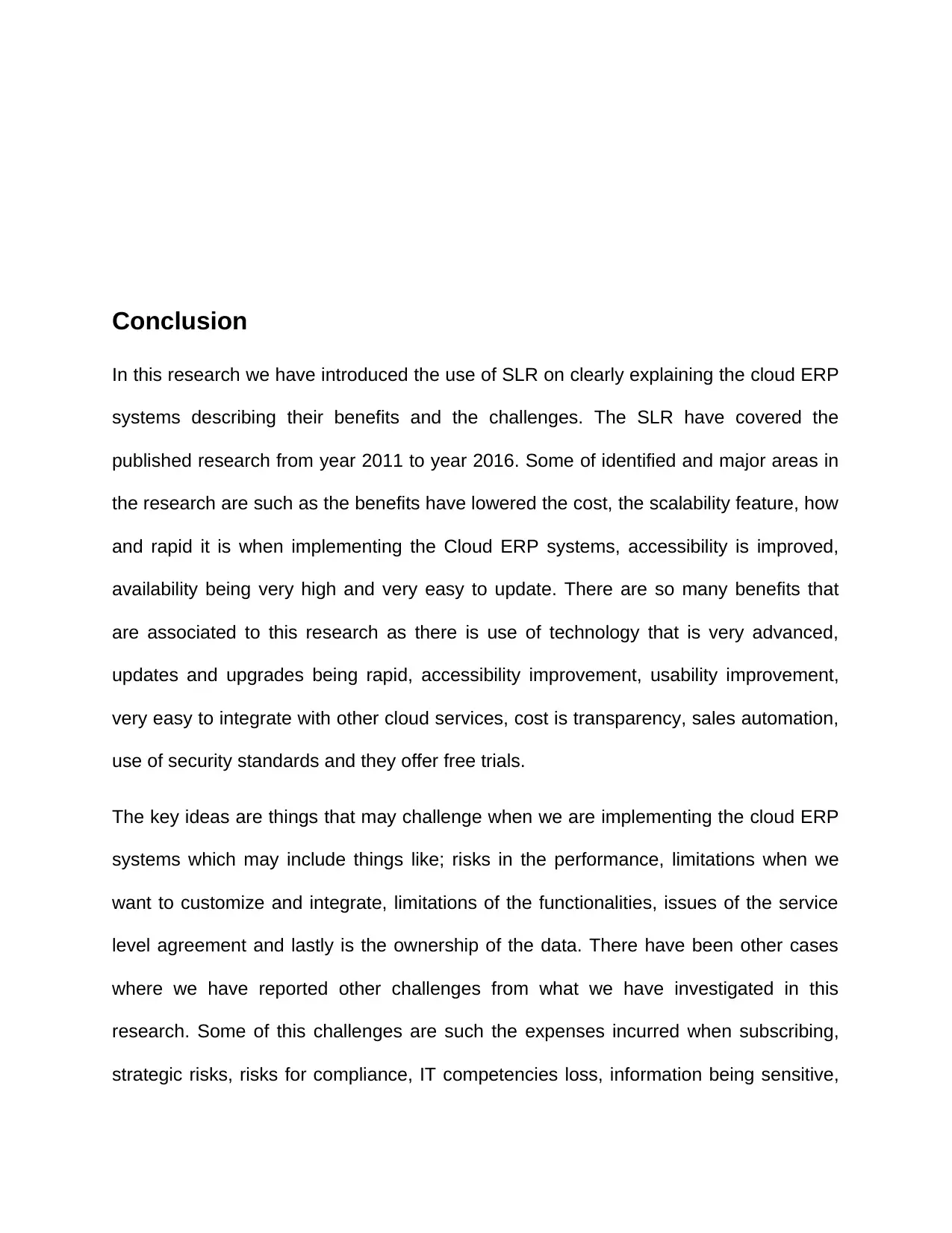
Conclusion
In this research we have introduced the use of SLR on clearly explaining the cloud ERP
systems describing their benefits and the challenges. The SLR have covered the
published research from year 2011 to year 2016. Some of identified and major areas in
the research are such as the benefits have lowered the cost, the scalability feature, how
and rapid it is when implementing the Cloud ERP systems, accessibility is improved,
availability being very high and very easy to update. There are so many benefits that
are associated to this research as there is use of technology that is very advanced,
updates and upgrades being rapid, accessibility improvement, usability improvement,
very easy to integrate with other cloud services, cost is transparency, sales automation,
use of security standards and they offer free trials.
The key ideas are things that may challenge when we are implementing the cloud ERP
systems which may include things like; risks in the performance, limitations when we
want to customize and integrate, limitations of the functionalities, issues of the service
level agreement and lastly is the ownership of the data. There have been other cases
where we have reported other challenges from what we have investigated in this
research. Some of this challenges are such the expenses incurred when subscribing,
strategic risks, risks for compliance, IT competencies loss, information being sensitive,
In this research we have introduced the use of SLR on clearly explaining the cloud ERP
systems describing their benefits and the challenges. The SLR have covered the
published research from year 2011 to year 2016. Some of identified and major areas in
the research are such as the benefits have lowered the cost, the scalability feature, how
and rapid it is when implementing the Cloud ERP systems, accessibility is improved,
availability being very high and very easy to update. There are so many benefits that
are associated to this research as there is use of technology that is very advanced,
updates and upgrades being rapid, accessibility improvement, usability improvement,
very easy to integrate with other cloud services, cost is transparency, sales automation,
use of security standards and they offer free trials.
The key ideas are things that may challenge when we are implementing the cloud ERP
systems which may include things like; risks in the performance, limitations when we
want to customize and integrate, limitations of the functionalities, issues of the service
level agreement and lastly is the ownership of the data. There have been other cases
where we have reported other challenges from what we have investigated in this
research. Some of this challenges are such the expenses incurred when subscribing,
strategic risks, risks for compliance, IT competencies loss, information being sensitive,
⊘ This is a preview!⊘
Do you want full access?
Subscribe today to unlock all pages.

Trusted by 1+ million students worldwide
1 out of 14
Related Documents
Your All-in-One AI-Powered Toolkit for Academic Success.
+13062052269
info@desklib.com
Available 24*7 on WhatsApp / Email
![[object Object]](/_next/static/media/star-bottom.7253800d.svg)
Unlock your academic potential
Copyright © 2020–2026 A2Z Services. All Rights Reserved. Developed and managed by ZUCOL.





